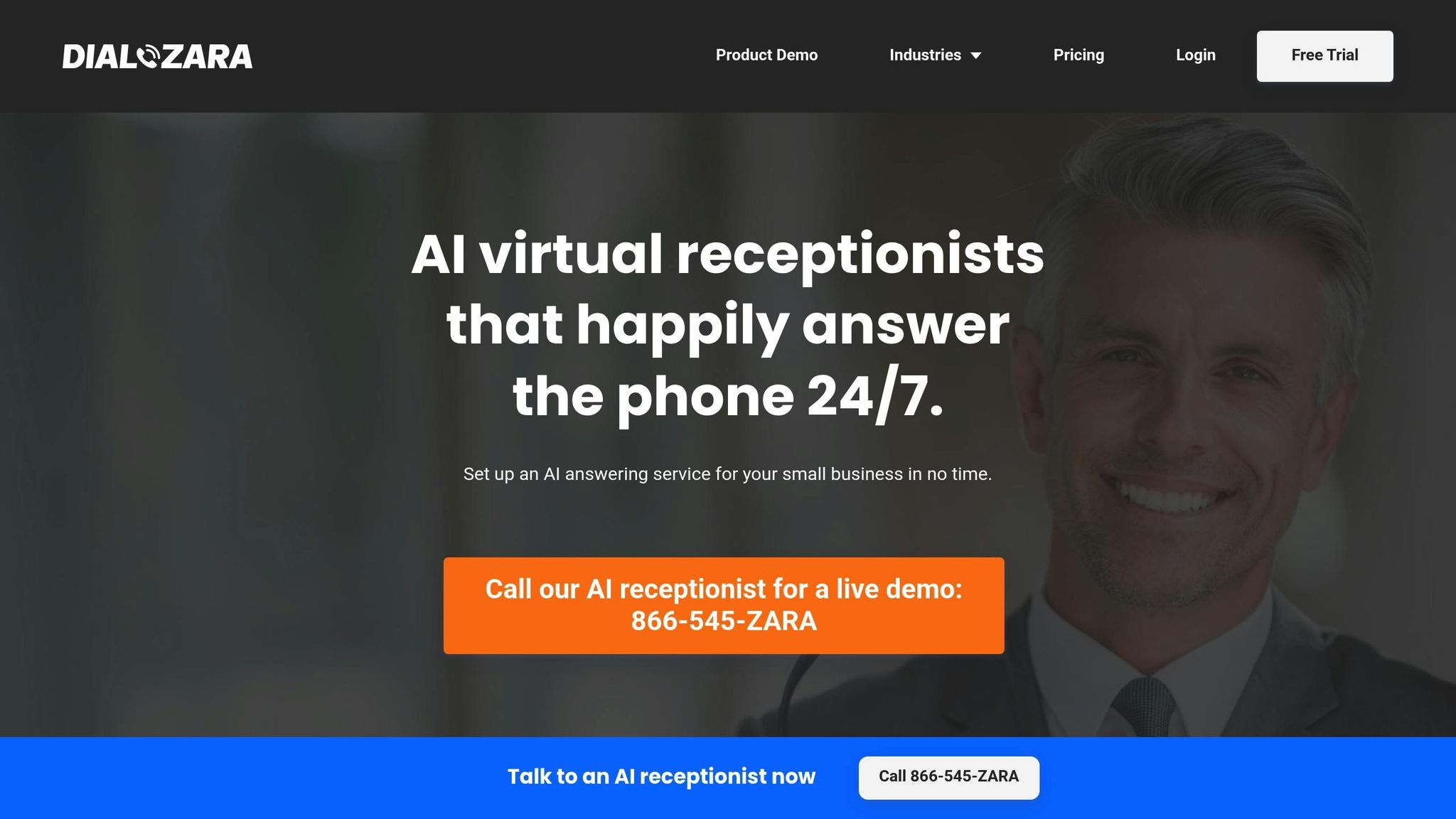
Custom AI Models for Industry-Specific Jargon
Custom AI models trained on your industry's language deliver 30% better accuracy and save millions in operational costs.

Written by
Adam Stewart
Key Points
- Industry-trained AI models deliver 20-30% better accuracy than generic solutions
- Plan for 70-80% of development time on data prep and collection
- Fine-tune for small datasets, build custom models for 50K+ examples
- Legal firms save $1.2M annually with 62% faster document reviews
Custom AI models outperform general-purpose AI by excelling in industry-specific tasks. They improve accuracy by 20-30%, process queries 50% faster, and handle specialized terminology with ease. Businesses using these tailored models report up to 40% higher productivity and significant cost savings, like $1.2M annually in legal firms.
Key Benefits:
- Specialized Terminology Recognition: Better understanding of niche terms.
- Faster Processing: Reduces handling time for complex tasks.
- Higher Accuracy: Improved precision in domain-specific tasks.
How to Build One:
- Data Collection: Gather and clean industry-specific data.
- Model Selection: Choose fine-tuning or custom models based on data size.
- Training & Testing: Use metrics like term recognition accuracy and domain-specific precision.
Custom AI is already transforming industries like healthcare, law, and finance. For example, legal AI models reduced document review time by 62%, while healthcare models achieved 92% accuracy in clinical tasks. Regular updates and expert feedback ensure these models stay effective over time.
How to Build an Industry-Specific AI Model
Creating AI tailored to a specific industry requires a structured approach to overcome the limitations of generic models. Here's a three-step process to get it right.
1. Data Collection and Preparation
Everything starts with gathering and refining high-quality, domain-specific data. Here's a breakdown of the key steps:
| Phase | Actions | Tips |
|---|---|---|
| Collection | Gather documents, integrate APIs | Pull from diverse sources like technical manuals and communications. |
| Cleaning | Correct errors, standardize data | Use text processing tools for pattern recognition and cleaning. |
| Annotation | Label terms, mark context | Work with industry experts to ensure accuracy. |
| Validation | Verify consistency | Automate quality checks for efficiency. |
Investing time here is critical, as data preparation typically consumes 70-80% of development time[1].
2. Selecting Model Type
Your next step is choosing the right model approach. This depends on your data, technical resources, and industry needs:
- Fine-Tuning: Ideal for smaller datasets (5,000-10,000 examples). It's faster but offers less control.
- Custom Models: Requires 50,000+ examples and advanced ML expertise. These models provide greater flexibility and can meet specific regulatory demands.
Consider factors like data availability, technical capacity, and whether your industry requires highly specialized architectures.
3. Model Training and Testing
Once your data and model type are ready, it's time to train and test. A healthcare AI trained on 50,000 clinical notes, for example, achieved 92% accuracy in symptom coding while cutting manual review by 73%[2].
Key practices for success:
- Leverage Transfer Learning: Start with pre-trained models to save time and resources.
- Track Domain-Specific Metrics: Focus on precision and error rates to measure effectiveness.
- Continuous Feedback Loops: Regular expert reviews help refine the model over time.
Using AI Models in Your Business
Once you've developed a specialized AI model, the next step is to implement it in areas where it can make the biggest impact.
AI Model Use Cases
Various industries have seen impressive results by integrating tailored AI solutions. For example, in healthcare, custom AI models have improved medical image analysis and diagnostic support. In finance, AI has been used to detect fraud and provide personalized investment recommendations. Meanwhile, legal professionals have relied on AI for contract review and analysis.
| Industry | Primary Use Case | Key Advantages |
|---|---|---|
| Healthcare | Medical image analysis | Better interpretation of medical terms |
| Legal | Contract review | Accurate parsing of legal references |
| Financial | Fraud detection | Identification of fraud patterns unique to the sector |
| Customer Service | AI phone support | Effective handling of technical queries |
The effectiveness of these AI applications depends heavily on their ability to grasp and process field-specific language. For instance, legal AI tools must navigate intricate jargon and legal precedents, while healthcare AI models need to interpret complex medical terminology with precision.
Phone Support with Dialzara

A great example of specialized AI in action is Dialzara, a phone-based customer service system. Dialzara showcases how AI can elevate customer service while maintaining accuracy in industry-specific language. Here's how:
1. Industry-Specific Communication
Dialzara's AI agents excel at understanding and responding to specialized terminology across sectors like healthcare, legal, and finance, ensuring professional and accurate interactions.
2. Operational Efficiency
The system handles high call volumes without compromising quality, making it a reliable tool for scaling customer support operations.
3. Customization Options
Dialzara offers personalization through adjustable voice settings and scripts tailored to specific industries, ensuring relevance and effectiveness.
sbb-itb-ef0082b
Model Updates and Management
Once you deploy AI models tailored to a specific industry, keeping them up to date is key. Regular updates ensure the models stay aligned with changing terminology and business requirements. Research from Algorithmia shows that 22% of companies update their AI models weekly, while 33% choose monthly updates to maintain performance levels.
Getting and Using Feedback
Gathering feedback is a must for keeping industry-specific language models accurate. Companies should use multiple channels to evaluate how their AI is performing. Here are some common feedback methods:
| Feedback Channel | Purpose | Implementation Method |
|---|---|---|
| In-app Mechanisms | Real-time error reporting | Embedded UI elements |
| User Surveys | Assess performance over time | Scheduled surveys |
| Error Logging | Automatically detect issues | System-generated logs |
| Expert Review | Validate with professionals | Regular consultations with domain experts |
To make the most of this feedback, set up a structured review process. Analyze user-reported issues, find patterns in misunderstood terms, and prioritize updates based on their impact. Combining user insights with expert input ensures your model stays effective.
Measuring Success
To evaluate how well your AI model performs, use a mix of quantitative and qualitative metrics. Focus on these key indicators:
- Industry Term Recognition Accuracy: Measure how well the model identifies terms specific to your field.
- Domain-Specific Accuracy: Test the model's performance with industry-focused scenarios.
- Time-to-Resolution: Track how quickly it processes specialized queries.
Keeping an eye on term recognition rates and scenario test results can highlight gaps in the model's knowledge. At the same time, monitor operational metrics like processing speed and error rates. Use these insights to guide updates through retraining and automated learning processes.
Summary
AI models tailored to specific industries are proving to be highly effective in managing specialized business terminology. These models often deliver 20-30% better accuracy than general-purpose AI and handle industry-specific queries up to 50% faster.
Main Points
Custom AI models excel at understanding industry-specific language due to three core strengths:
| Capability | Impact & Performance |
|---|---|
| Specialized Terminology Recognition | 20-30% improvement in document review accuracy |
| Processing Speed | Up to 50% faster query processing |
| Contextual Understanding | 97% precision in domain-specific tasks |
These advantages are supported by real-world examples. For instance, the LegalAI contract analysis model by LawTech Solutions achieved 97% precision in identifying critical clauses when deployed at Johnson & Partners law firm. This implementation also reduced document review time by 62%, saving the firm $1.2 million annually.
Dialzara applies similar principles, training AI agents on industry-specific terminology to manage complex tasks in healthcare and legal services. These agents ensure seamless, natural communication while tackling specialized interactions.
To maintain effectiveness, these models require regular updates to their terminology, access to extensive industry data, and feedback systems - key factors outlined in earlier sections to ensure continuous progress.
FAQs
What is the difference between general AI and specific AI?
General AI is built using broad datasets, making it suitable for a wide range of applications. On the other hand, industry-specific AI is trained on focused, domain-specific data, allowing it to handle specialized tasks and technical language more effectively.
| Characteristic | General AI | Industry-Specific AI |
|---|---|---|
| Training Data | Broad and diverse | Focused on specific industries or domains |
| Accuracy | Adequate for general tasks | High for specialized tasks |
| Processing Speed | Standard | Optimized for niche queries |
| Compliance | Basic security | Tailored to meet industry regulations (like HIPAA) |
| Cost | Lower upfront cost | Higher ROI due to precise performance (e.g., Accenture study findings) |
For example, Dialzara uses custom-trained models to handle complex legal and medical terminology in client interactions. This approach highlights the benefits of specialization, particularly for businesses that rely on precise, industry-specific language.
Summarize with AI
Related Posts
How Conversational AI Improves Customer Service
Explore how conversational AI revolutionizes customer service by automating queries and providing 24/7 support, reducing costs and improving satisfaction.
Domain Specific Training: How to Train NLP Models for Your Industry
Learn how to effectively train NLP models with domain-specific data to enhance accuracy and efficiency in specialized fields.
Improving Telecom Customer Experience with Predictive AI
Explore how predictive AI enhances telecom customer service through proactive problem-solving, personalized experiences, and cost efficiency.
AI-Powered Customer Service: Cost Breakdown
Explore how AI-powered customer service reduces costs, enhances efficiency, and transforms customer interactions with 24/7 support and personalized experiences.
